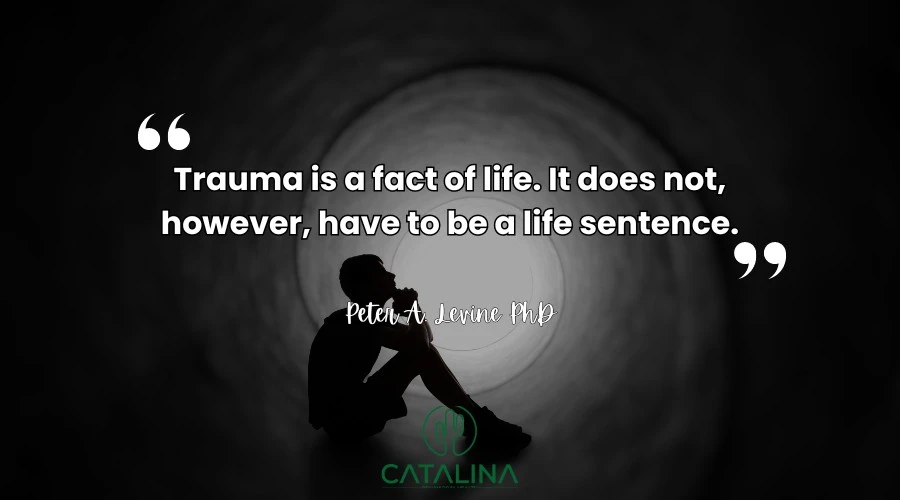Learn More About Trauma and Memory and Get Support at Catalina
Are you or someone you care about struggling with memory loss after a traumatic event? Experiencing PTSD and memory loss together is a coping mechanism the human brain uses to help trauma survivors cope with traumatic experiences.
These memory difficulties can be frustrating and harm the lives of people with PTSD. But rest assured that this situation is a stress response; it allows you to participate in everyday activities without the memories dictating your life.
Catalina Behavioral Health, one of Tucson’s premier mental health and rehab centers, can help people experiencing symptoms of memory loss caused by PTSD. If you live with PTSD or any other mental health condition, you can benefit from getting professional treatment from our team of specialists.
Read on to learn what causes these memory disturbances and how to heal!
Confidential Trauma and PTSD Assessment
Developing PTSD After Surviving a Traumatic Event
PTSD develops after someone has a traumatic event; in the case of complex posttraumatic stress disorder (C-PTSD), it may be a series of layers of several traumatic events. It is a mental illness documented in the Diagnostic and Statistical Manual of Mental Disorders (DSM-5).
The trauma overwhelms the person’s emotional coping mechanisms, leading them to feel fear, horror, or helplessness. The person will also have a higher risk factor for other mental health concerns in the future, including drug or alcohol abuse or depression.
The PTSD experience is not the same for every person, and PTSD symptoms’ severity will vary. Some may have mildly impaired event processing, carrying on with everyday events with only a little trouble. But other people with PTSD can have nightmares or flashbacks, re-experiencing symptoms daily (which is often noted in veterans).
Regardless of symptom severity, getting help for coping with the trauma can help restore good mental wellness for people with PTSD.
Understanding Memory Loss and PTSD: 3 Forms of Impact

Memory is a complex brain function that is essential in our daily lives. It helps us store, retain, and recall input from the world around us. The exact mechanisms of how memory works are not fully understood and are the subject of ongoing research.
However, these sections will focus on some of the things we do know about the connection between PTSD and memory loss.
The brain categorizes your memories into three types:
1) Short-term Memory
Short-term memory is the type you use to store a small amount of information that you need to recall quickly. The information remains available for up to a minute.
For instance, you rely on this when you memorize a phone number long enough to store it in your phone. Once you’ve keyed the number and saved it, the memory is gone
2) Long-term Memory
On the other hand, long-term memory aids in how your brain stores information for longer periods, even giving you access for the rest of your life.
This memory functioning breaks down into additional categories: explicit or implicit. An example of explicit memory is recalling facts, sometimes years later, such as recalled videos or movies with witty one-liners you remember for the rest of your life. Implicit memory is your unconscious ability to remember how to perform learned activities, like riding a bike.
3) Working Memory
Working memory is a combination of short-term and long-term memories. It retains and uses information that you apply to daily functioning. This explains how you can follow a conversation and then recall details about it later. It also explains how you can solve a math problem in your head.
The Impact of Memory Loss as a Trauma Response on Daily Life

Without seeking good treatment options, individuals suffering from PTSD and memory loss may not improve. While certain aspects of PTSD may feel better over time, the chronic stress of living with more severe PTSD and complex PTSD symptoms requires proper treatment.
Here are some things that can happen when you don’t seek PTSD treatment:
Increased Anxiety and Hypervigilance
Some struggling with posttraumatic stress disorder and memory loss feel constantly on edge or feel they may face potential threats. They also struggle with constant negative thoughts. They fear the recurrence of an event, even if they can only partially remember it. They may feel exhausted or overwhelmed in everyday life.
Decreased Emotional Regulation Skills
Those who struggle with mental health or PTSD diagnoses, along with lost memories, often have difficulty in processing their emotions. That’s because they don’t have a clear memory explaining what aspects of a traumatic event trigger these emotions. They may have sleep disturbances, emotional outbursts, and mood swings.
Relationships and Memory Problems
Memory loss can put a lot of stress on relationships with family and friends. Loved ones often don’t understand CPTSD or PTSD, never mind other mental illnesses. They may find some behaviors perplexing or feel offended when their loved one can’t focus on the present moment because of intrusive memories.
This impaired ability to recall things due to PTSD can also spill into workplace relationships. The increased risk of making mistakes or forgetting deadlines due to memory problems can cause colleagues to feel resentful.
A Pair of Memory Problems That Can Derive from Post-Traumatic Stress Disorder (PTSD)

Memory loss that comes from PTSD can be debilitating. It is not merely forgetfulness or difficulty recalling some minor detail. Instead, it can affect many facets of daily life. Here are ways trauma can affect memory.
Memory Fragmentation (Disjointed Memories)
Traumatic events can cause fragmented memories when someone can’t recall the event or explain it clearly. The memories of the event that caused the PTSD appear as snippets, making it difficult for them to piece together all the facts.
Disassociative Amnesia (Limited Recall of Traumatic Memories)
This memory impairment means people can’t recall important information about their lives, often after a traumatic experience. Dissociation is a protective mechanism. With the brain blocking stressful events, people can have memory gaps that cover entire events.
Get Effective PTSD Treatment Options at Catalina
Neurobiology: Connecting Post-Traumatic Stress Disorder and Memory Loss
Trauma can do more than just impair’ one’s recollection of details. Instead, key areas of the brain may have changed due to trauma which can reduce cognitive abilities. This section gives a quick overview of each of the brain-involved structures:
- Hippocampus: The hippocampus helps form new memories and retrieve older memories. It’s important for memory consolidation, or turning short-term memory into long-term memories. Also, the hippocampus helps understand contextual clues when problem-solving. Besides PTSD, this brain region is often the first to be impacted by dementia in older adults.
- Amygdala: The amygdala assists the brain with emotional processing; in treating PTSD, this region is important for shaping the perception of a threat.
- Prefrontal cortex: The prefrontal cortex (PFC) is responsible for higher cognitive functions, like making good decisions and paying attention to important information.
Each of these centers can feel the impact of post-traumatic stress disorder, especially with complex PTSD. It’s also important to note that PTSD can lead to high levels of stress hormones, causing further harm.
Getting Help With Memory Loss and Other PTSD Symptoms

If you or a loved one struggles with a PTSD diagnosis, you can get help and reclaim your chance at a better life. You don’t need to live with anxiety, flashbacks, or avoidance behaviors. Nor do you need to rely on substances to numb the painful memories caused by PTSD.
It’s time to turn to the Catalina team; we can help you cope with traumatic stress disorder (PTSD) using evidence-based techniques in our inpatient or outpatient treatment centers. You deserve the help – it’s time to replace the flashbacks and memory loss or PTSD with happy new memories.
The Catalina Behavioral Health team can help.
Up To 100% of Rehab Costs Covered By Insurance
Reach Out for Accredited PTSD Treatment at Catalina
The flashbacks, memory loss, and other symptoms of PTSD can be helped with intensive treatment. Our staff has the experience to help you overcome memory loss associated with PTSD by using evidence-based treatments to help process the underlying factor – the traumatic event. Once we address the trauma, your memory impairment often begins to improve.
If you are ready to close those memory gaps and stop living with the dementia-like symptoms of post-traumatic stress disorder, connect with us today! It’s time to start the PTSD healing process, and all calls are strictly confidential, so please reach out now.




